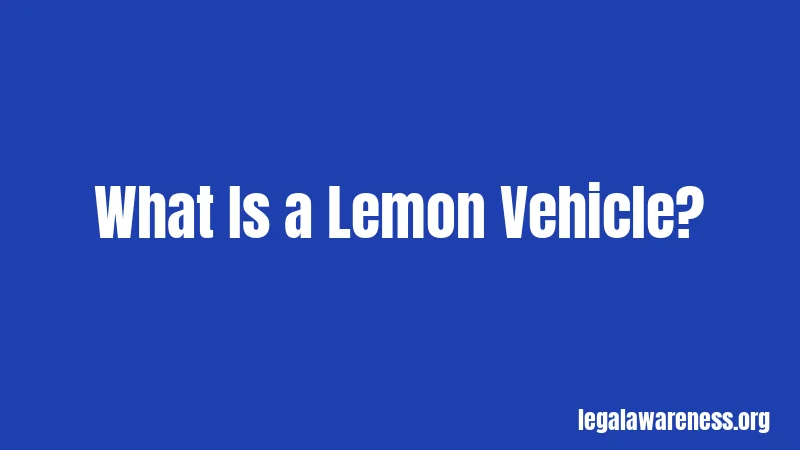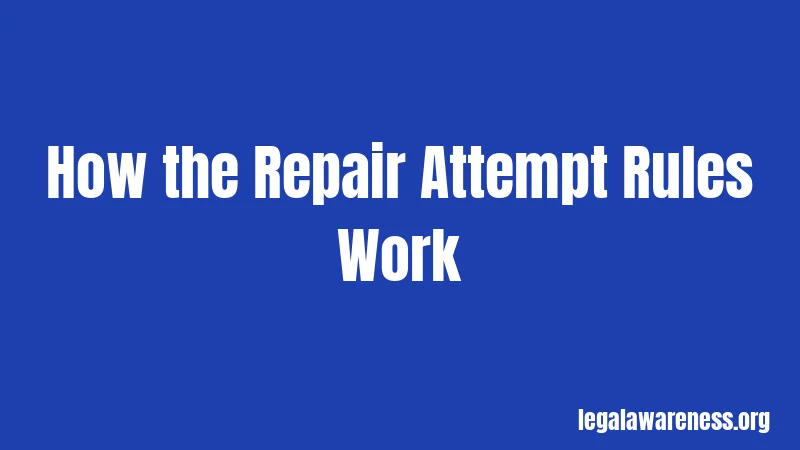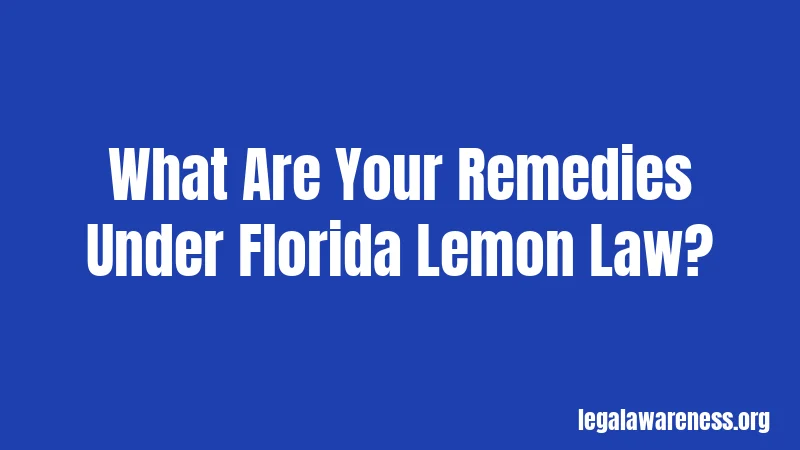Florida Lemon Laws in 2026: Get Your Money Back or a New Car
Most people have no idea this law even exists. Seriously. But in Florida, if you buy a defective new car or truck, you might qualify for a full refund or a brand-new replacement vehicle. The manufacturer has to do it. No questions asked.
Here’s the thing: major car purchases go wrong sometimes. The engine keeps overheating. The transmission slips. The electrical system acts up. When a dealer can’t fix it after multiple attempts, you shouldn’t be stuck with a broken vehicle. That’s where Florida’s lemon law comes in. It’s one of the most consumer-friendly laws in the state, and you need to know about it.
What Is a Lemon Vehicle?

Okay, let me break down the basic definition. A lemon isn’t just any defective car. It’s a specific type of vehicle problem that qualifies under Florida law.
A “nonconformity” is what the law calls it. That’s just a fancy word for a defect or condition that substantially affects the use, value, or safety of your vehicle. Think of it like a traffic ticket, but for cars that aren’t safe to drive.
Pretty straightforward, right?
Minor issues don’t count. A small paint scratch? Not a lemon. A door handle that’s a little loose? Probably not. But a door that swings open while you’re driving on the highway? That’s a problem. An engine that constantly stalls? Absolutely qualifies.
The key word here is “substantially.” Your vehicle has to have a serious problem. It can’t just be annoying. It has to actually impact whether the car is safe, usable, or worth what you paid for it.
Basic Florida Lemon Law Requirements
What Types of Vehicles Are Covered?
Here’s where it gets important. Not every vehicle qualifies for protection under Florida’s lemon law.
New cars and trucks are covered. Leased vehicles are covered too. But used cars? Generally not. The law exists to protect people who buy or lease vehicles for personal, family, or household use. If you bought a car to resell it as a dealer, you’re out of luck.
One more thing that surprises people: if you bought a used car from a private owner during the first 24 months after the original sale, you might still be covered. The clock starts from when the first owner got the vehicle, not when you bought it.
Trucks over 10,000 pounds? Not covered. Motorcycles and mopeds? Nope. Off-road vehicles? No protection. But your family sedan, SUV, or pickup truck? You’re protected.
The 24-Month Rights Period
This is crucial. You have exactly 24 months from the date you bought (or leased) your vehicle to report the problem to the manufacturer or dealership.
Let’s say you bought a new truck on January 15, 2024. That means your window closes on January 15, 2026. Any defect discovered after that date doesn’t qualify for lemon law protection.
But wait, it gets better. You have 60 additional days after that 24-month period expires to file a formal claim. So you’re not completely out of time immediately after the 24 months ends. You’ve got a couple more months to submit your paperwork.
Wondering if your defect fits the timeline? If something went wrong during those first 24 months and you reported it during that window, you’re golden. The fact that the repair attempts happened later doesn’t matter.
How the Repair Attempt Rules Work

This part is really important because it determines whether you qualify for a remedy.
Florida law recognizes two different ways a vehicle can be presumed to be a lemon. Understanding these can save you thousands of dollars.
The Three-Repair Rule
Here’s the most common path. If you’ve taken your vehicle to an authorized dealer or service center for repairs of the same problem three times, and it’s still not fixed, you’re approaching lemon status.
But the manufacturer gets one final chance. After three unsuccessful repairs, you have to send written notice to the manufacturer itself (not the dealer). Use certified or express mail with return receipt requested. This is important—don’t just call them. Send it in writing.
The manufacturer then has 10 days to direct you to a repair facility. Once you drop the car off there, they have up to 10 days to fix the problem.
If that final repair attempt fails? The vehicle is presumed to be a lemon. You can proceed with the arbitration process to get your refund or replacement.
The 30-Day Out-of-Service Rule
Now here’s the path that surprises a lot of people. Your vehicle doesn’t have to visit the repair shop three times to qualify. It just has to be there for long enough.
If your car is out of service for repair of any nonconformity (or multiple nonconformities) for a cumulative total of 30 or more days, it’s presumed to be a lemon.
Think about that for a second. Thirty days stuck in a repair shop. Your vehicle is undrivable. You’re stuck renting a car or bumming rides from friends. That’s a nightmare.
The manufacturer gets one inspection and repair opportunity after you hit 15 days out of service. But once you hit 30 days total? Game over. You’re eligible to proceed with your claim.
Sound complicated? It’s actually simpler than the three-repair rule. Just keep track of the days.
Penalties for Defects That Aren’t Your Fault
Honestly, this is the part most people miss. The law specifically excludes defects caused by accidents, abuse, neglect, modification, or alteration by anyone other than the manufacturer.
So if you dropped the car off a cliff, that’s on you. If someone else modified the engine, that doesn’t count. But a defect that came from the factory? That’s covered.
The manufacturer can try to argue that you caused the problem. This is why documentation matters so much. Keep every repair receipt. Take photos of problems. Get a diagnostic report from a licensed mechanic if you can. You’ll need this evidence to prove the defect wasn’t your fault.
What Are Your Remedies Under Florida Lemon Law?

Let me spell this out clearly because this is the whole reason you’d pursue a claim.
If the arbitration board decides your vehicle is a lemon, you get to choose between two options. The manufacturer must either buy back your vehicle or provide you with a replacement. Your choice.
Full Refund Option
If you choose a refund, here’s what you get. The manufacturer pays you the purchase price of the vehicle. They also cover any collateral charges you incurred—things like sales tax, title fees, registration, and dealer-installed accessories.
They don’t pay you in cash and leave you with the broken car. They take the car back. The lender (your bank or credit union) gets the loan paid off. Everything is handled.
You do get charged a “reasonable offset for use.” This is basically a mileage deduction based on how much you drove the car. The more miles you put on it, the bigger the deduction. But the calculation is reasonable and spelled out in the statute.
Leasing? It works differently. The lease company gets paid off, and you get back your deposit and rental payments minus the offset for use.
Replacement Vehicle Option
You can ask for a completely new vehicle instead. The replacement has to be identical or reasonably equivalent to the lemon. The manufacturer’s sticker price on the replacement can’t exceed 105 percent of the lemon’s sticker price.
So if your vehicle cost $25,000, the replacement can’t be more than $26,250.
You still get hit with the reasonable offset for use. But otherwise, you get a brand-new car with a full manufacturer’s warranty. That’s pretty sweet.
The Arbitration Process Explained
Okay, pause. Read this carefully. This is how you actually get your remedy.
Not all manufacturers have to go through the state arbitration process. Some big manufacturers sponsor their own arbitration programs. If yours has one and they told you about it when you bought the car, you have to use theirs first.
But here’s the good news: if the manufacturer’s program doesn’t decide your case within 40 days, or if you’re not satisfied with their decision, you can appeal to the state board. So it’s not a dead end.
Filing with the Florida New Motor Vehicle Arbitration Board
If there’s no manufacturer program, or if you’re appealing their decision, you file with the state board. This is handled by the Florida Attorney General’s office.
You have a deadline. File within 60 days after your 24-month lemon law rights period expires. Or within 30 days of the manufacturer’s program final decision. Don’t miss these windows.
The board conducts an eligibility screening first. They determine whether your claim even qualifies. If it does, you get a hearing.
Bring documentation. Bring repair records. Bring photos. Bring your diagnostic reports. Three-member panels hear these cases, and they need evidence. They have to decide whether your vehicle truly substantially impairs your use, value, or safety.
Who Can Actually File a Lemon Law Claim?
Here’s who qualifies. You need to be the original purchaser. Or if you’re a second owner, you need to have received the vehicle from the original owner within the first 24 months of their ownership.
You’re not alone if you’re confused about this. Most people don’t realize that second owners get protection too.
The vehicle also has to be for personal, family, or household use. If you bought it as a business vehicle or intended to resell it, you don’t get protection.
Magnuson-Moss Warranty Act: Extra Protection
Here’s something many people don’t know. Florida’s state lemon law isn’t your only option.
There’s a federal law called the Magnuson-Moss Warranty Act. If you don’t qualify under Florida’s law, you might qualify under federal law. Sometimes both laws apply to the same situation.
You could potentially recover incidental damages and attorney’s fees under the Magnuson-Moss Act. Those are things Florida’s law doesn’t always cover.
This is why talking to an attorney matters. They can evaluate your specific situation under both laws.
How to Start Your Lemon Law Claim
Let me walk you through this step by step.
Step 1: Document Everything
Keep every single repair receipt. Take photos of the defect if it’s visible. Record the date you first reported the problem. Write down the mileage each time you visit the repair shop. Get the names of the service advisors you spoke with.
This stuff is evidence. The board will want it.
Step 2: Report the Defect to the Manufacturer
Tell the dealership about the problem. They’re the manufacturer’s authorized service agent. Get a work order that documents what’s wrong.
If you can, get the manufacturer’s contact information from your warranty paperwork. You’ll need this later.
Step 3: Get Those Three Repair Attempts (or 15 Days)
Bring the vehicle back for repairs. Keep going until you either hit three unsuccessful repair attempts or 15 days out of service.
Step 4: Send the Written Notice
Once you’ve hit three repairs or 15 days out of service, send a certified letter to the manufacturer. Tell them you’re requesting a final repair opportunity.
You can download a “Motor Vehicle Defect Notification” form from the Florida Attorney General’s website. Use that form. Send it registered or express mail with return receipt requested.
Include your vehicle identification number (VIN). Include a description of the defect. Keep a copy for yourself.
Step 5: Wait for the Final Repair Attempt
Give the manufacturer 10 days to schedule the repair. They have 10 more days after you drop the car off to fix it.
If they fix it, great. But if they don’t? You’re moving to arbitration.
Step 6: File for Arbitration
Download the Request for Arbitration form from the Attorney General’s office. Submit it along with copies of your documentation.
The eligibility screening happens first. If you pass that, you’ll get a hearing date.
Getting Help with Your Claim
You’re not alone in this. Many lemon law attorneys will take your case for free because attorneys’ fees are recoverable if you win.
Seriously. You might not pay anything out of pocket.
The Lemon Law Hotline is available. Call 1-800-321-5366 inside Florida, or 850-414-3500 if you’re calling from out of state. They can answer basic questions and send you the forms you need.
An attorney can really help. They know the law. They know how to calculate your damages correctly. They know how to present evidence the board will listen to.
Special Circumstances and Exceptions
Not everything is straightforward. There are some situations that need extra attention.
Recreation Vehicles
Got an RV with problems? The lemon law covers them, but the rules are slightly different. Out-of-service time is 60 days instead of 30. Final repair attempts get 45 days instead of 10.
Subsequent Owners
You’re the second owner of a vehicle with existing defects? You might have protection if the original owner bought it within the last 24 months and the defect was reported during that window.
Lease Termination Penalties
Leasing a vehicle that turned out to be a lemon? Good news. You can’t be charged an early termination fee if you get a replacement or refund.
Frequently Asked Questions
Does my cosmetic damage count as a lemon?
Probably not. Small dents, paint scratches, or interior wear don’t qualify. The defect has to substantially affect use, value, or safety.
Can I get an attorney’s fees if I win?
Yes. Qualifying consumers can recover attorney’s fees as part of their award. This is why many lemon law attorneys work for free initially.
What if the dealer won’t admit the car has a problem?
Get an independent diagnostic report from a licensed mechanic. This is solid evidence that the defect exists.
How long does arbitration take?
Typically a few months from filing to hearing. Then decisions usually come within 40 days of the hearing. The manufacturer has 40 days to comply with the decision.
Do I keep the car while my claim is pending?
Yes. You keep driving it while the claim processes. The manufacturer will take possession if you win and choose a refund.
What if the manufacturer ignores the arbitration decision?
The decision is binding on the manufacturer. If they don’t comply within 40 days, you can sue in court to enforce it. That’s rare though—most manufacturers comply.
Final Thoughts
Florida’s lemon law is genuinely consumer-friendly. It protects you from being stuck with a defective vehicle. The arbitration process is free. Attorney’s fees are recoverable. And you have legitimate options for getting your money back or a replacement.
The key? Document everything. Hit your deadlines. Send written notices. Keep all your paperwork organized.
You don’t have to accept a broken car. You’re not required to keep paying for a vehicle that doesn’t work. Florida law is on your side.
If you think you have a lemon, call the hotline or contact an attorney. Get a free case review. You might be eligible for thousands of dollars or a brand-new vehicle. It’s worth exploring.
References
Florida Attorney General – Lemon Law Division https://www.myfloridalegal.com/lemon-law
Florida Statute 681 – Motor Vehicle Sales Warranties https://www.leg.state.fl.us/Statutes/index.cfm?App_mode=Display_Statute&URL=0600-0699/0681/0681.html
Florida Bar – Consumer Tips on Lemon Law https://www.floridabar.org/public/consumer/tip007/
BBB National Programs – Florida Lemon Law Information https://bbbprograms.org/programs/dr/lemon-law/florida
Lemon Law Hotline 1-800-321-5366 (Inside Florida) 850-414-3500 (Outside Florida)
Federal Magnuson-Moss Warranty Act https://www.consumer.ftc.gov/articles/what-warranty-law
